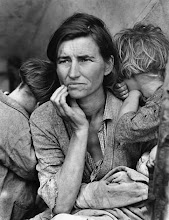
Hello Hoovervilleians! This took me a bit longer than planned but it's finally come together.
Over the next few days I'll be updating different subjects.
Today you'll find some basic Depression Era links as well as a link to help you find a name for your character. Why don't we all commit to having these by the run through on Thursday October 16?
Still need a name for your character? Go here. Remember the show takes place in 1933 so take the age of your character and subtract :) Then find your characters birth year and click the link next to it that says "names."
The Great Depression (1929-1939) -- The National Parks Service, Eleanor Roosevelt National Historic Site webpage. Not all the links work. I'll be posting the good and working ones.
A Scrapbook of Me : Trip to Washington, DC during the Depression -- Personal blog of a woman recounting her parents trip to DC in 1940. Vehicles and fashion remain fairly true to 1933.
Depression Era Soup Kitchen Close-up - St. Louis, Missouri -- This is a link to a personal Flickr site. if you do some exploring in rodnial1's photostream you'll find some different takes on this photo.
Child of the Depression -- A few memories and a few good pictures of the 1930s
Streetscapes: Central Park's 'Hooverville'; Life Along 'Depression Street' -- some of my favorite quotes from the article
- "We work hard to keep it clean, because that is important," said one man. "I never lived like this before." The next day seven of the men were arrested as vagrants, but the charges were dismissed.
- But it was still open Oct. 3, when Patrick McDermott, an unemployed bricklayer, was given six months in jail for dancing and singing along the top of the reservoir wearing "less clothing than deemed proper." He earlier reported that he had collected $47 from 3,000 visitors who had come to see the shantytown.
- Government could seem benign but also cruel. When the East River colony was cleared in 1933 (with 10 days' notice) "old John Cahill" told a reporter: "Nobody's askin' us where we're goin'. There's not a soul thinkin' about us."
- Then, as now, there were many homeless people who refused to accept the officially sanctioned help. When their camps were broken up, they moved peacefully on, with only mild protest and certainly no revolt. And in the end, as everyone else seemed to hope, they just sort of disappeared.
A letter to the editor of the NY Times in response to the previous article -- It's brief but a nice example of an outisder's memory of what the Hoovervilles looked like.
